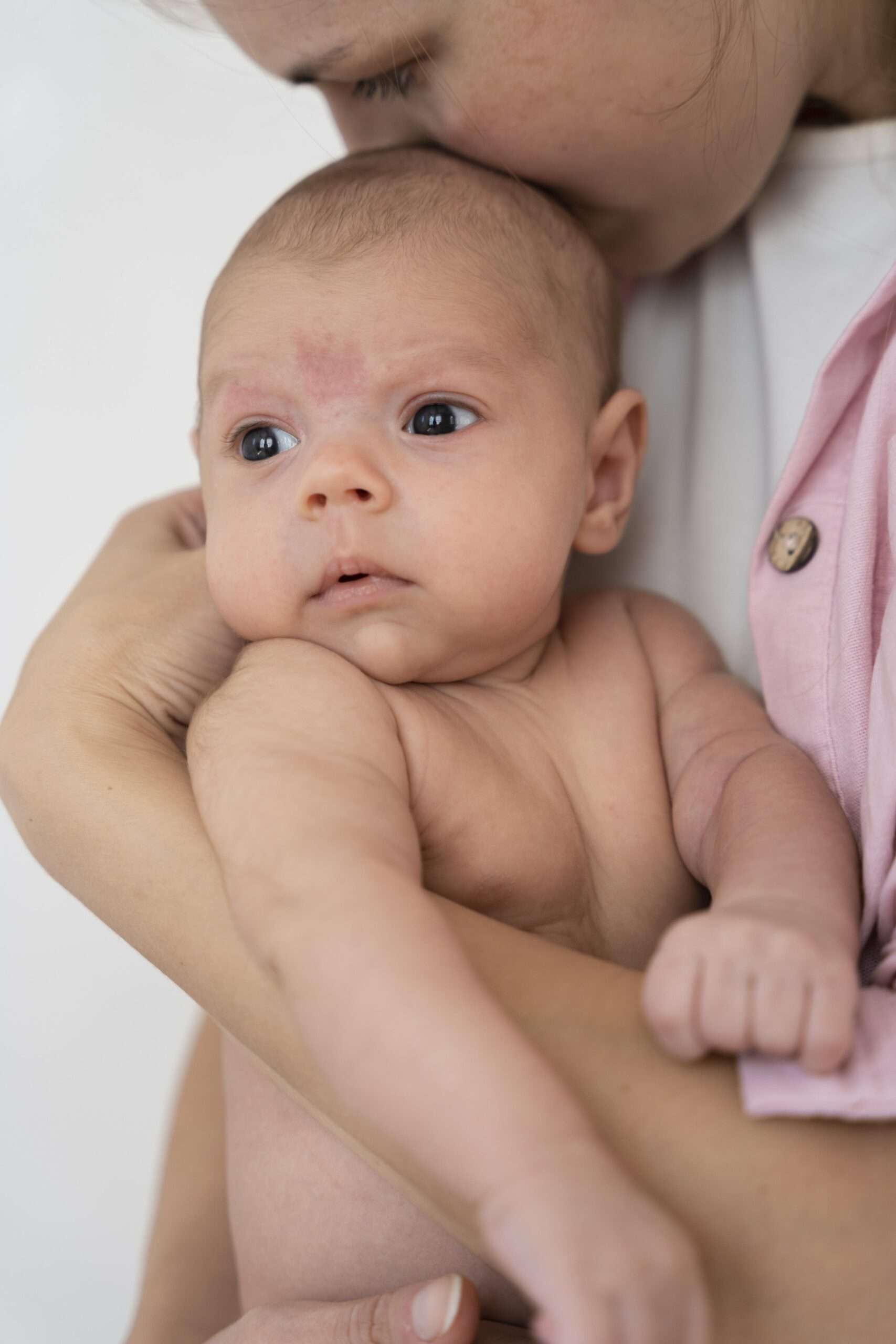Newborn Sticky Eye: Causes, Symptoms, and Home Remedies
- Dr Owais Rafiq
- October 30, 2024
- 4:48 pm

Newborn Sticky Eye: Causes, Symptoms, and Home Remedies
Caring for a newborn is overwhelming, especially when faced with conditions unknown, like sticky eyes. Newborn sticky eye, or neonatal conjunctivitis, is the most common affection to encounter most babies. Their eyes will appear crusty or watery due to excess discharge from the eyes. Since this condition is very often not harmful, being familiar with what a newborn sticky eye is, how it can be treated at home, and when to see a doctor can make a great difference in your efforts to safeguard the eye health of your newborn baby.

The article tries to cover the causes and symptoms of newborn sticky eyes with home remedies.
What Is a Newborn Sticky Eye?
- Newborn sticky eye is a condition in which inability of the tear ducts to function will bring about some blockage of tear outflow from the eyes through the nose. This condition is also very common in newborns because the tear ducts are not properly developed at birth. They produce excessive tears in their eyes, which causes discharge, thereby making the eyes stick or crust.
Some causes may be due to an eye infection with irritation, among other symptoms. The baby’s sticky eye usually is not serious. However, your observation of the symptoms plus knowing when to see a doctor because the condition persists or becomes worse in some cases will assist you accordingly.

Common Causes of Newborn Sticky Eye
There are many reasons why a newborn develops sticky eyes. The knowledge of what is the cause will help you decide on the appropriate course to take.
- Blocked tear duct: The gluey eye in babies is sometimes caused due to a blocked tear duct too. This causes an accumulation of tears that cannot flow down so, becomes a gooey mass around it and an eye watery and gooey especially after naps or after sleep.
- Conjunctivitis or “pink eye”: It is the infection or inflammation of the conjunctiva – this is a very finely elastic membrane that appears on the inside of the eyelids and also covers the sclera – the white part of the eye. Many children develop conjunctivitis soon after birth due to bacterial or viral infection from the birth process, either because of sticky discharge, redness or irritation.
- Sticking eyes: This sign also could be with infections acquired through delivery. Infections are normally passed from the mother through her bacterial or viral infection, chlamydia and gonorrhea, which normally infect the eye of the baby at delivery.
- Irritants: Sometimes the coldness or dust, smoke, or bad chemicals in the surrounding can also make the eyes of a newborn to be irritated, producing a lot of tears or sticky discharge. Infants are over reactive and therefore it is necessary that infants be placed in a clean and safer environment.
Newborn Sticky Eye Symptoms
Home remedies and ways of managing symptoms, of course, begin with the identification of symptoms. Some common symptoms of the newborn sticky eye include:
- Excessive Tearing: Among the very first symptoms of sticky eye, excessive tearing or watery eyes occur even if your baby doesn’t cry. This consequently results in a pooling effect of tears in the eyes.
- Sticky or Crusty Discharge: The most striking feature of a sticky eye is the discharge. Usually, it collects in the corners of the eyes and can be watery to thick in consistency. This is usually what leads the eyelids to stick together when waking up.
- Difficulty in Opening of Eyes: In more severe cases, this crusting on an eyelid from the gooey discharge limits the baby’s ability to open his or her eyes, especially immediately after sleep.
Though they lead to a whole lot of distress in parents, the newborn sticky eye is a relatively
harmless condition that responds to home care without the need for medical intervention. However, one is advised to seek medical help if they get worse.
Home Remedies for Newborn Sticky Eye
- Warm Compress: These loosen the sticky discharge causing irritation and soothe it. For this, immerse a clean piece of cloth or cotton ball in warm (not hot) water, wring it out very carefully so as not to splash, and press it over the affected eye for some minutes. This way, the blocked tear ducts open up and discomfort is eased.
- Gently Clean the Eyelids: If a baby’s eyes become crusted over with this discharge, they must be carefully wiped with a clean, warm cloth. Health professionals should use a cotton wool swab or soft cloth dipped in warm water to clean the corner of the eyes to remove the parched crusty hardening up of discharges.
- Massage the Tear Ducts: One of the recommendations is to massage around the area of the tear duct of the baby with the aim of helping to free any blockage that is there to enhance drainage.
- Avoid your baby’s environment from being dirty with irritants and be clean: in case your baby develops eye irritation, avoid exposing them to smoke, dust, and other harsh chemicals. You should also keep their bedding and surrounds clean.
When to Seek Medical Advice
While most newborn sticky eyes can be handled by home care, conditions to consult the doctor include:
- The discharge is yellowish or greenish: This might be due to some bacterial infection which should be treated with antibiotics.
- Your little one’s eyes become red or bulge: Those may result from conjunctivitis or some infections, thus a condition that would require an expert touch.
- The sticky eye does not heal within a few days of home care: In the event that the condition does not improve or may worsen, you should visit a doctor for a follow-up assessment.
- Your baby is acting like he or she is affected: If your baby is constantly rubbing his or her eyes or seems to be in discomfort, it’s always advisable to seek a doctor for a proper assessment of any related condition.
How to Prevent Newborn Sticky Eye
While the condition of the newborn sticky eye might sometimes occur, there is much that you can do to reduce the chances of the condition arising in your baby:
- Practice Good Hygiene: Women should ensure they wash their hands before touching their baby’s face or the eyes especially. It may just act as a preventive measure against the germs and infections from spreading in the eyes.
- Minimal exposure to irritants: The client should also avoid exposure to environ-mental irritants such as fumes from cigarettes, dust and chemicals like very strong cleaning solutions. The environment of living should be clean and adequately aired for the baby.
- Always monitor for signs of infection: If you have symptoms of an infection or see any signs of redness, swelling or more discharge than seek your healthcare provider.
FAQs
-
Is a newborn sticky eye contagious?
Sticky eyes in newborns, which causes conjunctivitis, will most definitely be infectious if the conjunctivitis results from bacterial or viral pathogens.
-
How long does a newborn sticky eye last?
A birth-sticking eye usually clears up on its own within a few weeks when tear glands are developed.
-
Can blocked tear ducts be treated through surgery?
Tear ducts in newborn babies don’t necessarily have to be operated on if they are blocked. However, if the blocked ducts persist after one year of age, then a doctor may advise some minimal intervention that unclogs them.
Dr Owais Rafiq
Subscribe to Dr Owais YouTube channel
For parenting advice, child health, symptoms, causes and treatment of illness in children.





